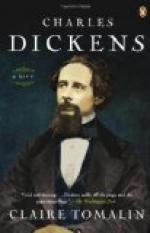The change naturally brought him more fully into the prison circle. He used to breakfast there every morning, before going to the warehouse, and would spend the larger portion of his spare time among the inmates. Nor do Mr. Dickens and his family, and Charles, who is to us the family’s most important member, appear to have been relatively at all uncomfortable while under the shadow of the Marshalsea. There is in “David Copperfield” a passage of inimitable humour, where Mr. Micawber, enlarging on the pleasures of imprisonment for debt, apostrophizes the King’s Bench Prison as being the place “where, for the first time in many revolving years, the overwhelming pressure of pecuniary liabilities was not proclaimed from day to day, by importunate voices declining to vacate the passage; where there was no knocker on the door for any creditor to appeal to; where personal service of process was not required, and detainers were lodged merely at the gate.” There is a similar passage in “Little Dorrit,” where the tipsy medical practitioner of the Marshalsea comforts Mr. Dorrit in his affliction by saying: “We are quiet here; we don’t get badgered here; there’s no knocker here, sir, to be hammered at by creditors, and bring a man’s heart into his mouth. Nobody comes here to ask if a man’s at home, and to say he’ll stand on the door-mat till he is. Nobody writes threatening letters about money to this place. It’s freedom, sir, it’s freedom!” One smiles as one reads; and it adds a pathos, I think, to the smile, to find that these are records of actual experience. The Marshalsea prison was to Mr. Dickens a haven of peace, and to his household a place of plenty. Not only could he pursue his career there untroubled by fears of arrest, but he exercised among the other “gentlemen gaol-birds” a supremacy, a kind of kingship, such as that to which Charles Lamb referred. They recognized in him the superior spirit, ready of pen, and affluent of speech, and with a certain grandeur in his conviviality. He it was who drew up their memorial to George of England on an occasion no less important than the royal birthday, when they, the monarch’s “unfortunate subjects,”—so they were described in the memorial—besought the king’s “gracious majesty,” of his “well-known munificence,” to grant them a something towards the drinking of the royal health. (Ah, with what keen eyes and penetrative genius did little Charles, from his corner, watch the strange sad stream of humanity that trickled through the room, and may be said to have smeared its approval of that petition!) And while Mr. Dickens was enjoying his prison honours, he was also enjoying his Admiralty pension,[3] which was not forfeited by his imprisonment; and his wife and children were consequently enjoying a larger measure of the necessaries of life than had been theirs for many a month. So all went on merrily enough at the Marshalsea.




